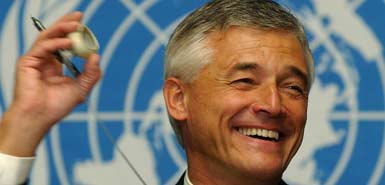
This is a guest post by Johanna Mendelson Forman. Forman is Senior Associate in the Americas Program at the Center for Strategic and International Studies.
Speaking for myself, I will never forget the day that Sergio Vieira de Mello was murdered along with other colleagues at the UN offices in Baghdad, Iraq. There are few leaders in the world of his vision and tenacious capacity. — Steve Clemons
Today marks the 5th anniversary of the brutal attack on UN Headquarters in Baghdad.
August 19, 2003 represents not only the death of one the UN’s greatest talents, Sergio Vieira de Mello and 22 other courageous international civil servants, but also the downward spiral of the UN’s ability to wage peace.
After the overthrow of Saddam Hussein in May 2003, and the subsequent occupation of Iraq by a Coalition of the Willing, the U.S. made an affirmative choice to go it alone, without the support of the United Nations. The decision to internationally ostracize the UN for its unwillingness to support an invasion of Iraq without Security Council approval also jeopardized the safety and security of UN officials who still felt compelled to support the humanitarian needs of Iraqi civilians.
As Kieran Prendergast, former Under Secretary-General for Political Affairs, noted the UN effort in Baghdad had become a “suicide mission” and required complete UN withdrawal which occurred in October of 2003.
Looking back on such tragic events today it is unclear how much the UN could have accomplished in light of the fateful decisions taken by the U.S. and coalition administrators to demobilize the Iraqi army, which then formed the backbone of a vicious insurgency, or to de-Bathify thousands of civil servants who could have helped maintain some semblance of governance in many parts of the country.
Counterfactual assumptions are not helpful for understanding the past. What we do know is that had Sergio Vieira de Mello lived he would still have faced unbearable odds in rebuilding an Iraq after it had been the subject of intense UN sanctions.
It was institution vilified by many of those Iraqis who suffered as a result of the depravation caused sanctions, though ironically it was the Oil-for-Food program of the UN that helped to undermine the economic power of Saddam Hussein.
De Mello himself recognized the uphill battle he was facing even as he struggled to make sense of the mission he was given in Baghdad. According to his biographer, Samantha Powers, he yearned to be out of Iraq and was planning his exit when a suicide bomber attacked the Canal Hotel cutting him down.
As conditions in Iraq stabilize it is time to reconsider the role that the international community must play in supporting the small gains in governance, the improvement of the lives of women, and the continued humanitarian efforts that any war-torn society must have to recover.
This is not the time to debate UN relevance, or a time to evaluate what should have happened.
As the UN General Assembly begins a month from now it is urgent that the U.S. government reconsider the importance of the institution in its most demanding task to date: helping the U.S. find a way out of what may be one of the most intractable of conflicts launched by an administration eager for revenge after 9/11, but short on diplomatic solutions in a part of the world that was poised to implode.
— Johanna Mendelson Forman


7 comments on “A Tragedy Five Years Ago Today: Remembering Sergio and the UN in Iraq”